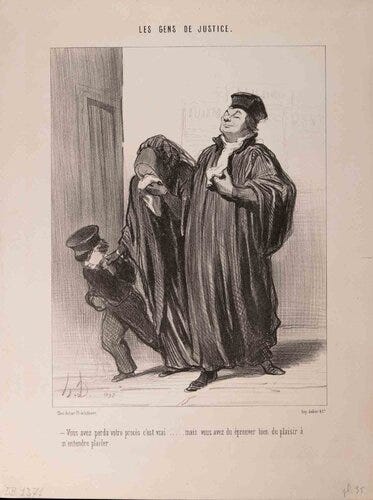Toronto, August 17, 2025
Walking man eats fish
Every time you turn around, someone is handing out advice on how to live a long life. Be mindful. Become a Buddhist. Do crosswords. Stay out of the sun. Eat fish. Walk 10,000 steps a day. Walk 10,000 steps a day while you eat a fish.
But what about your job? What are the best careers for those seeking longevity? Eytsegibers never talk about that. (Eytsegiber was one of my father’s favourite words—it’s Yiddish for “advice-giver” in the sense of “know-it-all.”) Of course, it’s way too late for me and most of my readers to worry about careers, but sometimes—not often— youngish people ask us for career advice. What should we tell them?
These days stable lifetime vocations are pretty much defunct. We live in a time of geopolitical and economic turmoil, climate chaos, and technical ultra-progress. No one knows what’s coming next. When I graduated from university in the 1960s anybody with a B average could comfortably choose from a variety of dull occupations that promised secure employment, predictable progress up the career ladder, and a defined benefit pension at age 65. That’s gone. All bets are off. Pity those trying to find their vocational way.
But, for old time’s sake, let’s look at four traditional occupations which still exist. Do any offer a good chance for a long life?
They say that chefs die young. They say it, I think, because of the well-publicized early deaths of celebrity chefs, generally by suicide. For example, Benoît Violier, chef of the 3-Michelin-star Restaurant de l’Hôtel de Ville in Crissier, near Lausanne, ranked #1 in the world by La Liste in December 2015, was 44 when he committed suicide in 2016. Homaro Cantu, chef and owner of the famous Chicago restaurant Moto, committed suicide in 2015 at age 38. Newspaper articles explain “Why so many chefs tragically die young” and ask “What’s Killing Young Danish Chefs?”
Look at how chefs live—long hours, extreme stress, physical strain, poor sleep, smoking, drinking, drug use. Of course, they die young. Except, they don’t. There is no statistical evidence that chefs have a lower life expectancy than any other occupational group. Yes chef!
Any discussion of long hours, extreme stress, poor sleep, and bad habits brings us naturally to the legal profession. All that drama in the courtroom, all that working through the night smoking stogies. Surely lawyers must die younger than most. But they don’t. Although, lawyers do have a morale-sapping problem: No one likes them (vide a multitude of lawyer jokes). Also, the legal profession has for some time been on shaky economic and ethical ground, and will soon be cataclysmically affected by Artificial General Intelligence. Big changes are coming. Not a good vocational bet.
Is it better to be a musician? That depends. A 2014 Macquarie University study found that mortality rates among pop musicians were two-to-three times higher than the general population. “Results showed excess mortality from violent deaths (suicide, homicide, accidental death, including vehicular deaths and drug overdoses) and liver disease for each age group studied compared with population mortality patterns.” According to the Macquarie study, the average age at death of a pop musician was slightly under 57 (but see Endgame #115). Jazz musicians do even worse, but classical musicians tend to live well into old age. The pianist Mieczysław Horszowski died at 100, giving concerts until the end. Arthur Rubinstein died at 95. The cellist Pablo Casals died at 96 (when he was 80, Casals married a 17-year-old soprano). Better Bach than bebop.
Which brings me to a fourth traditional occupation, the writing life, a solitary life of anguish and penury. What can one say? “Writing a book is a horrible, exhausting struggle, like a long bout of some painful illness. One would never undertake such a thing if one were not driven on by some demon whom one can neither resist nor understand.” That’s what George Orwell wrote about the writing life (“Why I Write,” 1946). He died in 1950 at the age of 46. Enough said.
*****
Some reader comments on Endgame #115 (“Looking good and going fast”)
Jack Batten, author and lawyer, and well-known Rolling Stones insider, describes a moment in history: “When Keith Richards was charged with drug possession in Toronto, I think he was busted while sleeping and I think it was not for simple possession, which was not too threatening, but for possession while trafficking which was serious. Austin Cooper defended Richards, and he hired me to be an expert witness. I actually wasn’t, not on rock anyway. Jazz was my field and still is (I have a jazz book coming out next year). But Austin still wanted me to testify, telling the court, which accepted me as a rock expert, and I testified that Richards was talented, a great rock musician, famous and rich and didn’t need to sell drugs. So he should be treated lightly on all charges. That’s how things turned out. The Provincial Court judge convicted Richards but the sentence required only that the Stones play a concert for the benefit of the Canadian Institute for the Blind which was the judge’s favourite charity. What left the lasting impression with me was how, ummm, unimpressive everything was. On the day of the court proceedings, someone from the Stones entourage was put in charge of me. Court opened, and he fell asleep. I testified and immediately got tongue tied. I sounded like a Nixon politician talking about Watergate. When Keith Richards came over to thank me, I found myself towering over him and I’m a short guy. The whole episode was hilarious except for the result which was just what Austin Cooper hoped for.”
From John Gregory: “Your closing line reminds me of advice I saw years ago—from Snoopy, though he had no doubt picked it up from somewhere older— ‘the secret of life is looking good at a distance.’”
The last word on looking good and going fast goes to Mary Lynn Reimer: “As Keef says, ‘It’s good to be here. It’s good to be anywhere.’”
And Michael Mendelson sends a late comment on Endgame #114 (“Big city walkers”): “Today in the Annex there are a few notable walkers. There is the guy with long sandy hair who goes for walks mainly on Bedford Road. His thing is that he always and only walks backwards! Then there is the elderly gentleman with a long white beard who wears a housecoat tied with a rope and walks slowly but with determination. He obviously came straight out of a Russian novel.”
*****
Note to readers: I started The Endgame in December 2022, and have been publishing one on Sunday mornings pretty much every week since then. But I have started a new writing project and need more time to work on it. So, from now on, The Endgame will be published every two weeks, rather than every week. Please adjust your expectations.
*****
Finally, the inevitable pitch:
Available from Amazon in most countries, and from some independent bookstores in Canada (coast-to-coast) including Ben McNally Books in Toronto, Munro’s Books in Victoria, B.C., Russell Books in Victoria, and Salt-Water Ballad Books in Port Medway, Nova Scotia.











Nice to see you back. Hope your new project goes well.
I am reminded of an entertaining book - though I can find at short notice only descriptions of the movie - Who is Killing the Great Chefs of Europe? My recollection is that there were some recipes ...https://www.rogerebert.com/reviews/who-is-killing-the-great-chefs-of-europe-1978